If you have a child that is afraid of dogs, then the most logical thing seems to not force them to interact with one.
But what if there’s a stray dog on your street? What if you take your child to the playground and there are some dogs on the way? What if your or your kid’s friends have dogs?
And worst of all, what if your family wants to have a dog despite your child being anxious around dogs?
Happens more often than you might think and while the fear might just be due to the kid being unfamiliar with animals, deep-seated fear might persist.
A recent 2022 study1 found that “Dog interventions lead to significantly lower stress in children” which echoes a 2016 study2 concluding that “pet dogs can provide socio-emotional benefits for children via stress buffering“.
Furthermore, “dog interactions are associated with reductions in depression and loneliness (…) and decreasing anxiety and arousal.“3
But can you make it work with a timid child?
Sure, but there are some things you want to look out for to make the relationship work.
Which breed you get will determine the canine’s size, temperament, energy level, and so much more.
No matter what breed you’ll choose for a scared child, it will require work on both sides; training your dog and child.
Why Is Your Child Scared of Dogs?
“I’m afraid of dogs!” is a not-so-uncommon sentiment for children when faced with the prospect of interacting with a four-legged creature.
Increased anxiety and avoidance of the dog can easily result in disastrous situations for both the kid and dog.
If your child is one of these kids who are fearful around dogs, you might want to consider getting them a dog that will be less likely to set off their fear response, but you’ll still need to address the underlying issue.
So why are children scared of dogs? There are three main reasons:
- Traumatic experience
- Fear from parents/relatives manifests
- Shy, timid child lacking canine interaction
If your kid had a bad experience with the neighbor’s dog, this can definitely result in anxiety around dogs.
It doesn’t have to be a flesh wound from a dog bite. Has your kid been knocked over by a big dog, growled at, or barked at? These can all be causes.
Furthermore, parents can project fear on their children.
You wouldn’t believe how often it’s the parents or other relatives that cause the anxiety in the first place.
Another source of fear of dogs in children is parents with a history of traumatic experiences involving dogs that they then project onto their offspring.
In cases where one partner wants a dog, the other one might constantly reinforce the anxiety by clamming up and avoiding dogs when out and about.
As a Rottweiler owner, I can definitely tell you that too many parents frantically switch the side of the road with no alarming signs whatsoever.
Shy children may benefit from one-on-one interactions with calm canines.
I’ll go into more detail below.
12 Best Dogs For Scared Children
There are a couple of things you might want to consider when choosing the right breed for a scared kid.
Some kids are afraid of big dogs while others had negative experiences with black dogs or really pushy, hyperactive ones running them over.
When choosing the right breed, check the following:
- Size
- Temperament
- Exercise/Grooming requirements
- Other specifics such as color, head shape, muscularity
It’s not rational to be afraid of certain head shapes but it’s essential to talk to the child in question to know about any specifics upfront.
Generally speaking, bully breeds or dogs with broad chests and skulls as well as black dogs are common sources of fear for children.
Every child will need to be taught how to behave around dogs and be desensitized to dogs beforehand.
Children can be quite intuitive with animals but need to be taught boundaries. Unfamiliarity is easier to tackle than deep-seated trauma so every child will need an individual evaluation.
No matter what breed of dog will share a home with your child, they all need exercise, mental stimulation, training, and financial resources as well as time.
1. Beagle
The Beagle is among the dog breeds that do not have a menacing or intimidating appearance.

These furry, friendly creatures are famous for their love of children and sometimes enjoy being around them more than adults.
Beagles grow to medium size but do not have a deep bark which can be a source of anxiety for children afraid of big dogs.
A Beagle is usually relatively low-maintenance and somewhat agreeable when it comes to training but as any other dog, they need adequate exercise and care.
2. Poodle
The poodle is a low-maintenance breed that looks super friendly with his curly fur, which is definitely helpful for children who are afraid of dogs.
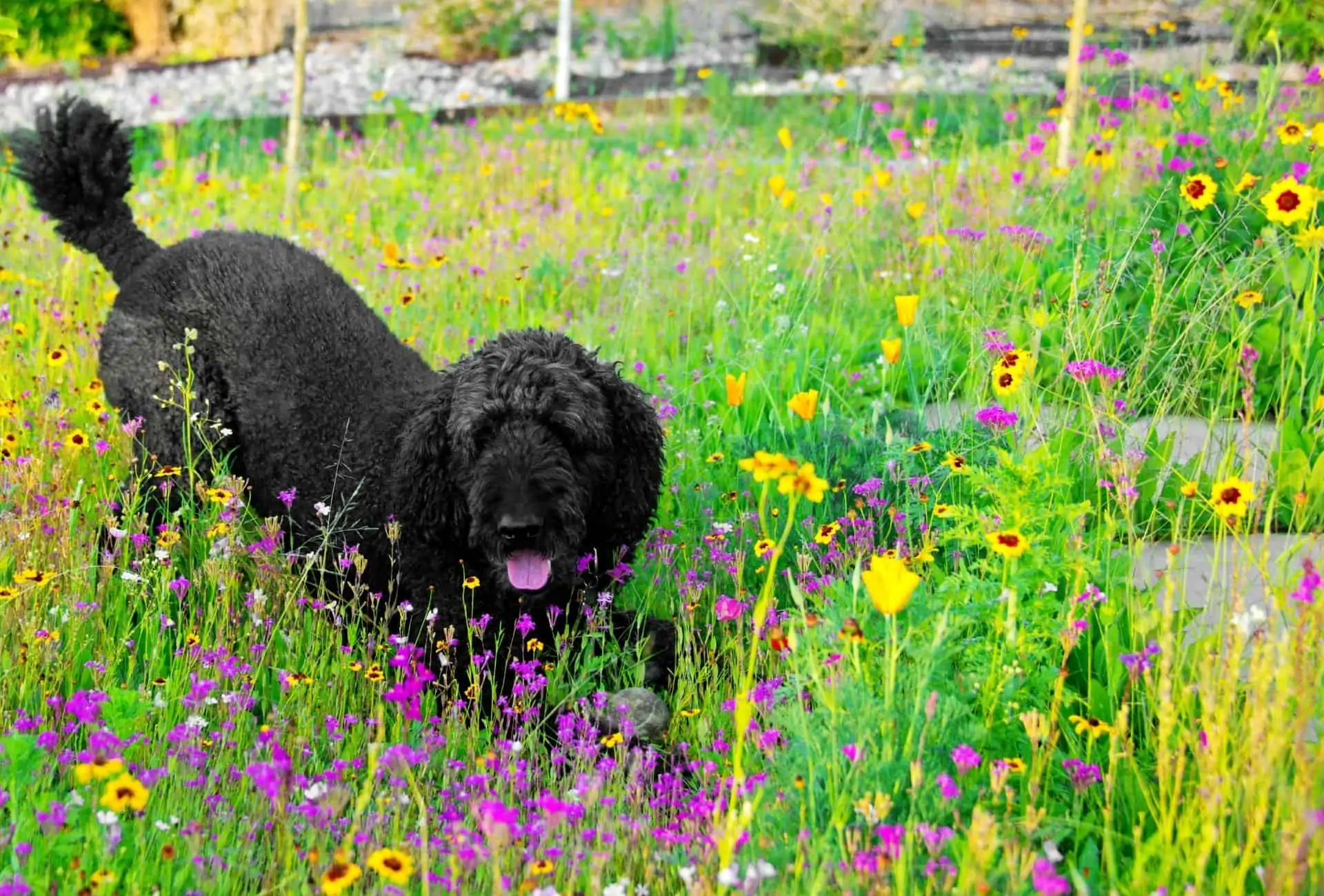
The Poodle’s appearance and playful demeanor are more inviting compared to other large dogs with heavy muscles and broad skulls.
Poodles can come in three different sizes (standard, medium, miniature) and if you’re looking into this breed, be aware that the Poodle is very smart and needs even more mental stimulation than other breeds.
3. Irish Setter
The Irish Setter is a relatively large dog but slender and might be a good fit for smaller children who are afraid of dogs.
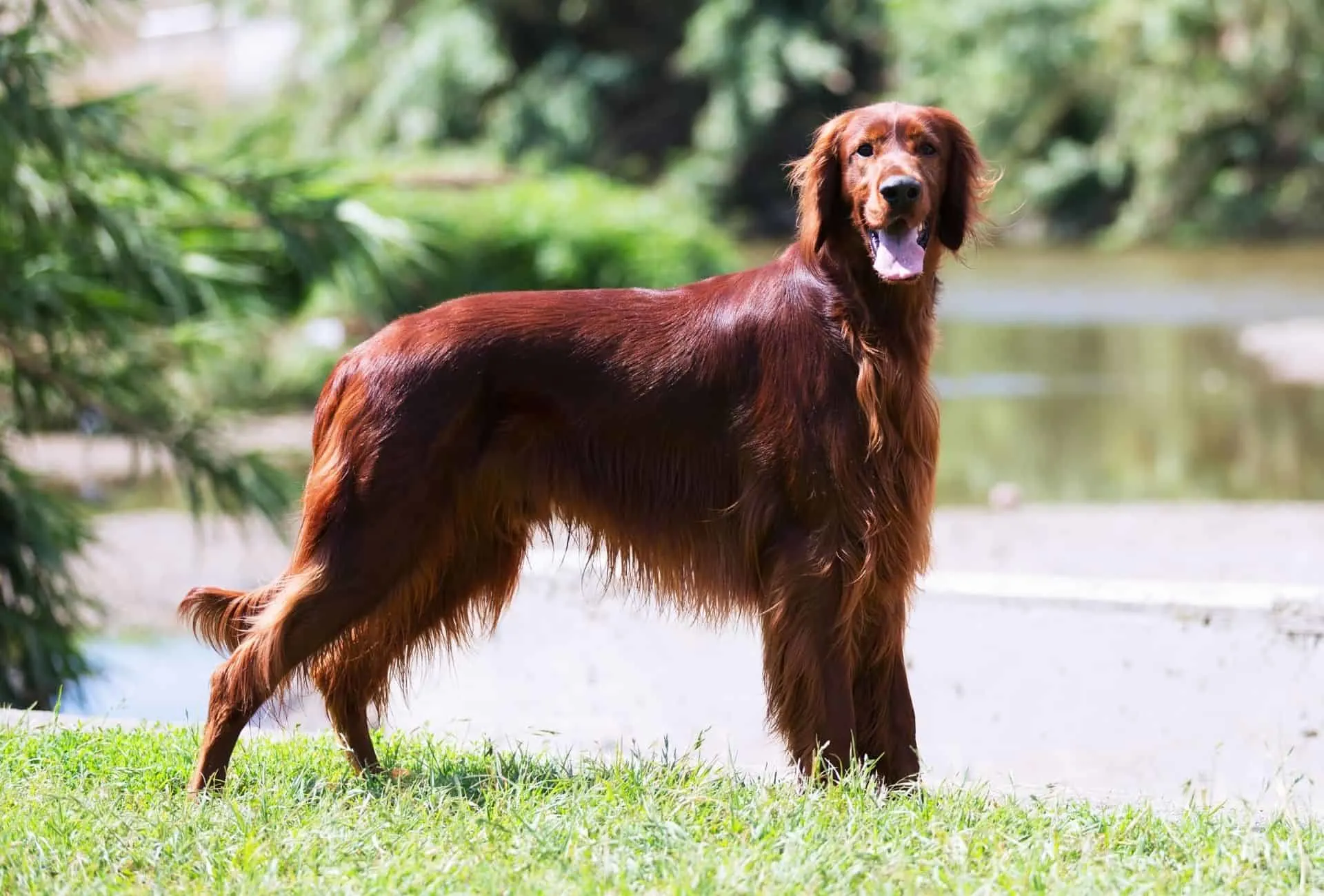
When raised and trained together, this breed can get along well with kids and has rarely been known to snap at strangers or other animals.
They also love human contact and are playful which may make them easier for shy children.
4. Nova Scotia Duck Tolling Retriever
The Nova Scotia Duck Tolling Retriever is a perfect breed for shy or introverted kids.
They have an outgoing and friendly personality that can help calm small children down when they get nervous around animals.
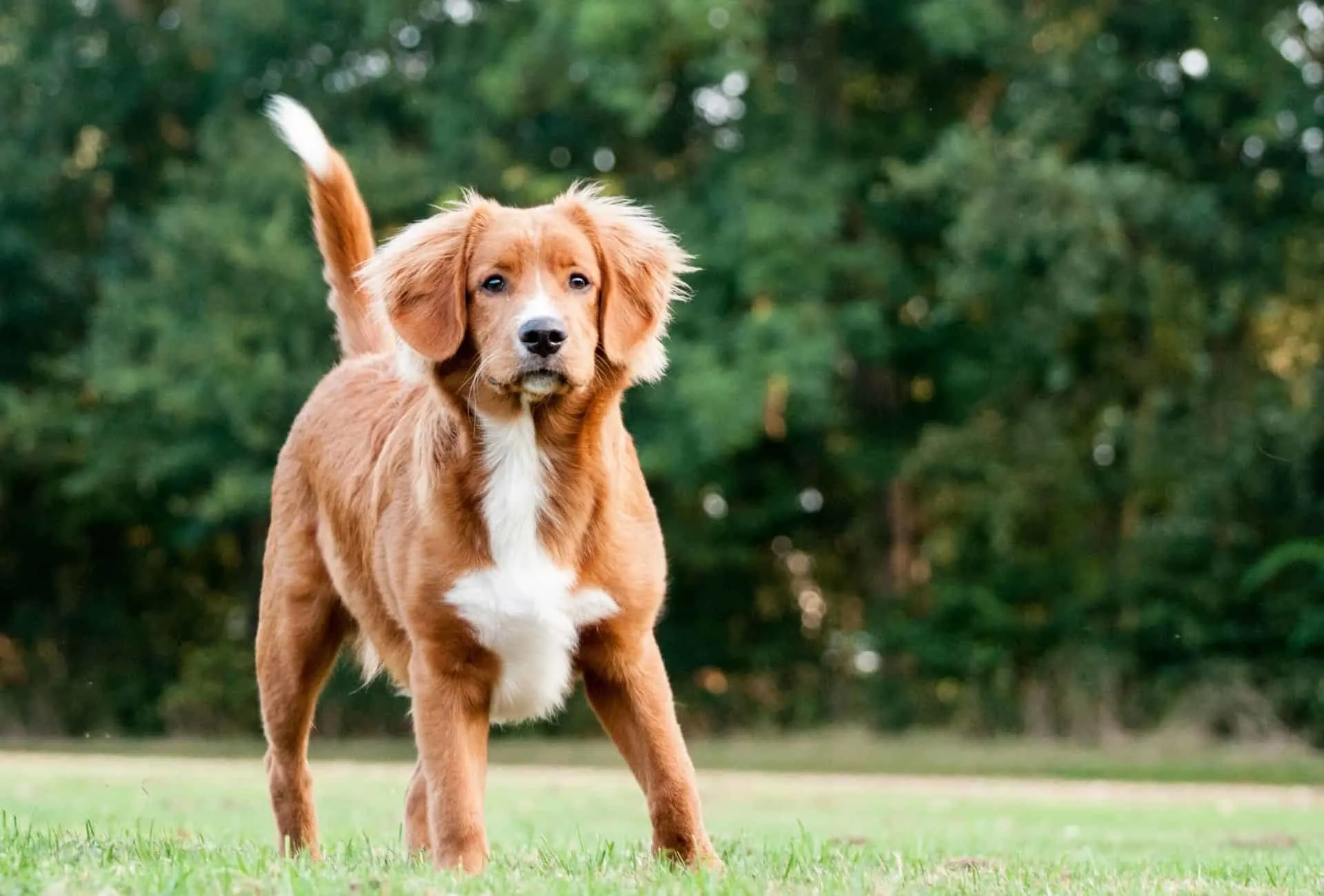
This dog also loves to play and will be great with the young owner, but make sure to get one with a fitting temperament as some Tollers can be easily overexcited and quite antsy when not exercised sufficiently.
5. Golden Retriever
I know, boring.
The Goldie is among the most popular breeds in the US for countless years now.
The Golden Retriever is a breed that usually loves to be around people which may make them a good fit for shy children who are afraid of dogs.
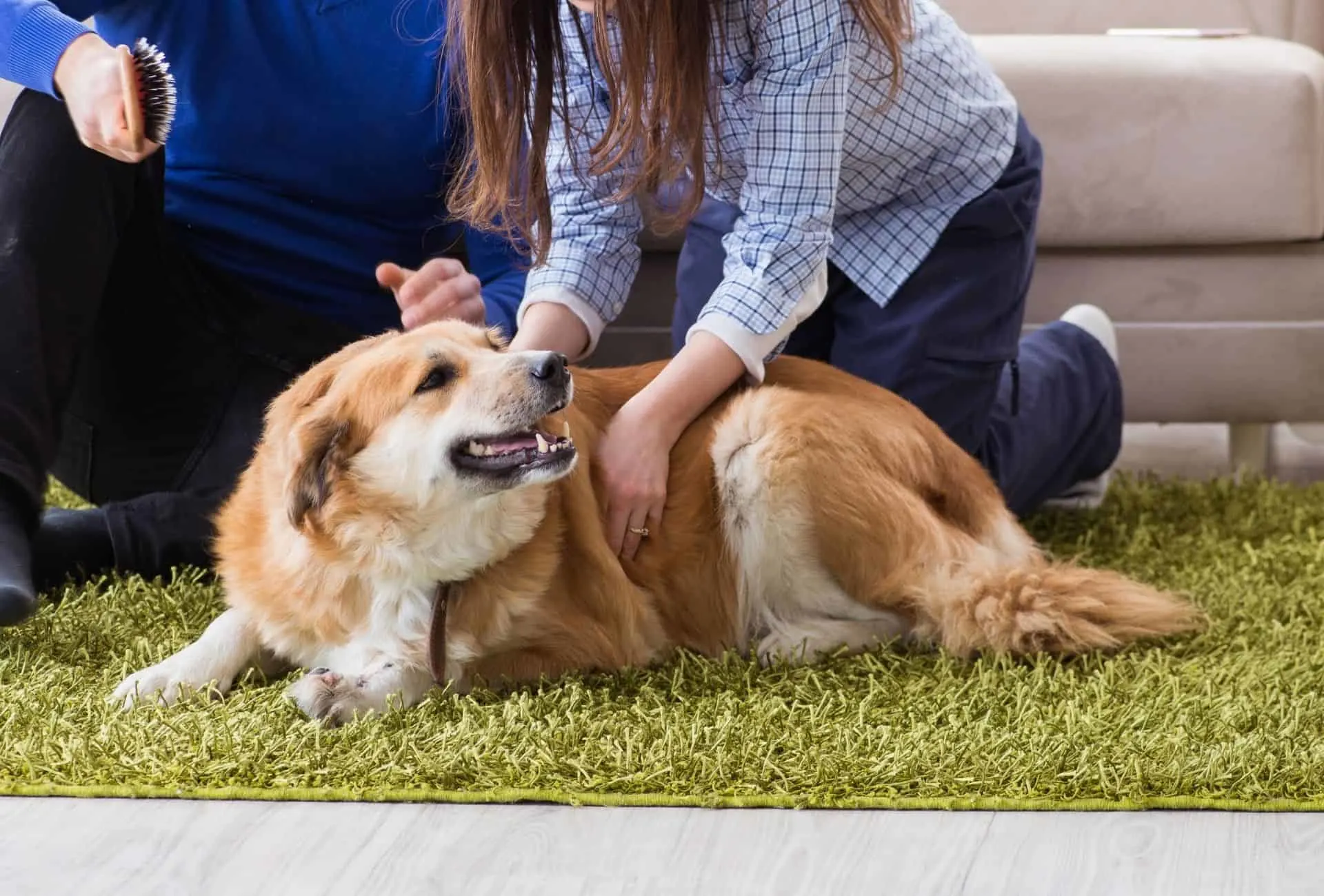
They also enjoy playing with other animals and will get along well with any child they live with if socialized properly.
Golden Retrievers are not as easy to maintain as other breeds on this list but they’re not high-maintenance either. Regular grooming should suffice.
6. German Shepherd
German Shepherds are known for being loyal to their owners and can make for great companions (and protectors) for any shy child.
They can be large and have an outgoing personality, making them perfect for children who need more time warming up to dogs.
However, their confident personality may scare some children off so make sure to introduce your GSD properly. If you’re getting a puppy beware that GSDs are known to have quite the puppy biting phase.
7. Bull Terrier
Bull terriers were actually used as nanny dogs in their country of origin.
While some may find the appearance of these dogs a bit daunting, others love their goofy demeanor and egg-shaped heads.
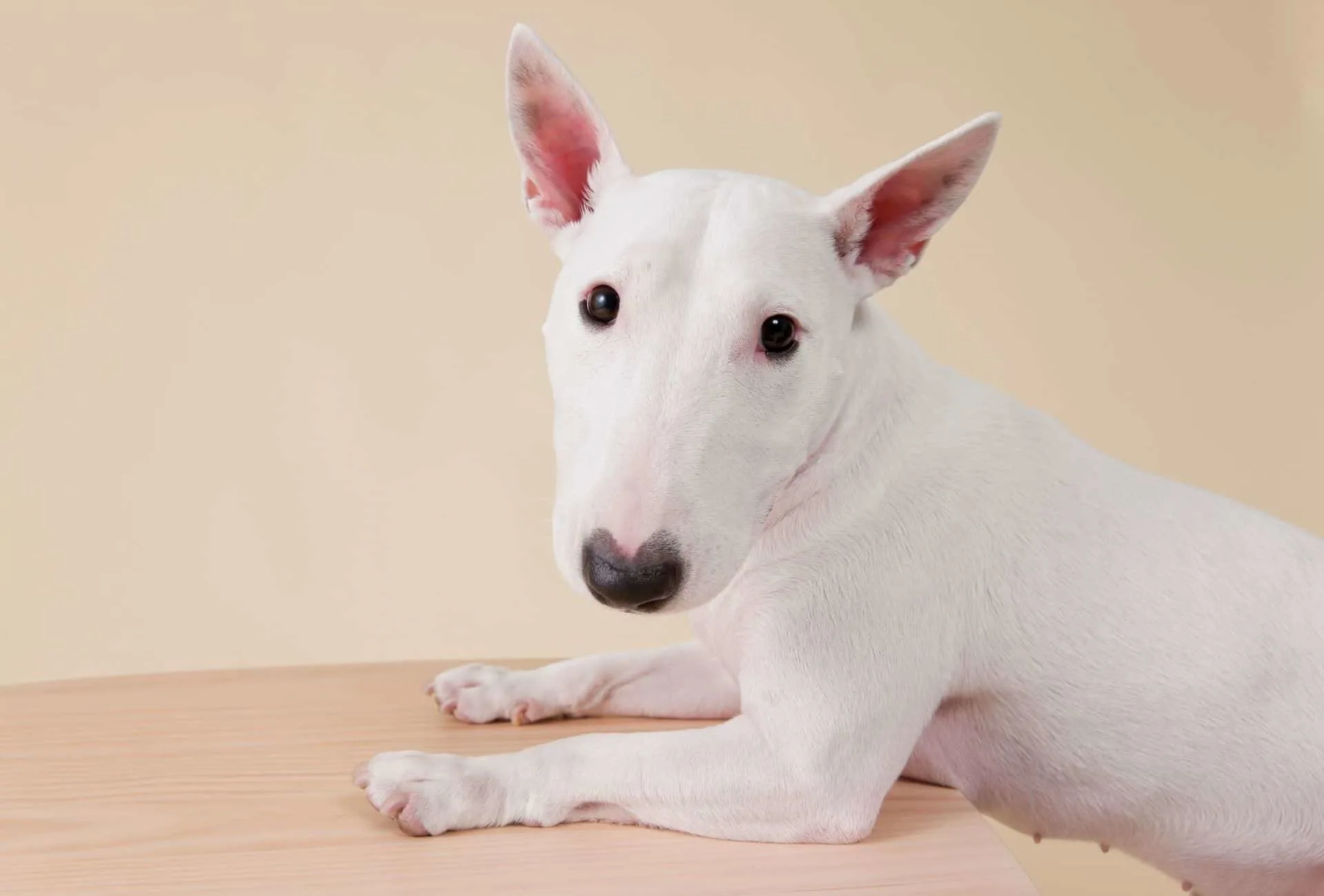
The Bullterrier is a muscular breed with a very strong jaw, so keep that in mind.
However, when you’re buying a pup from a good breeding line and socialize them properly, these dogs can make great family pets.
8. Bernese Mountain Dog
The Bernese Mountain Dog is described as being “calm and good-natured”.
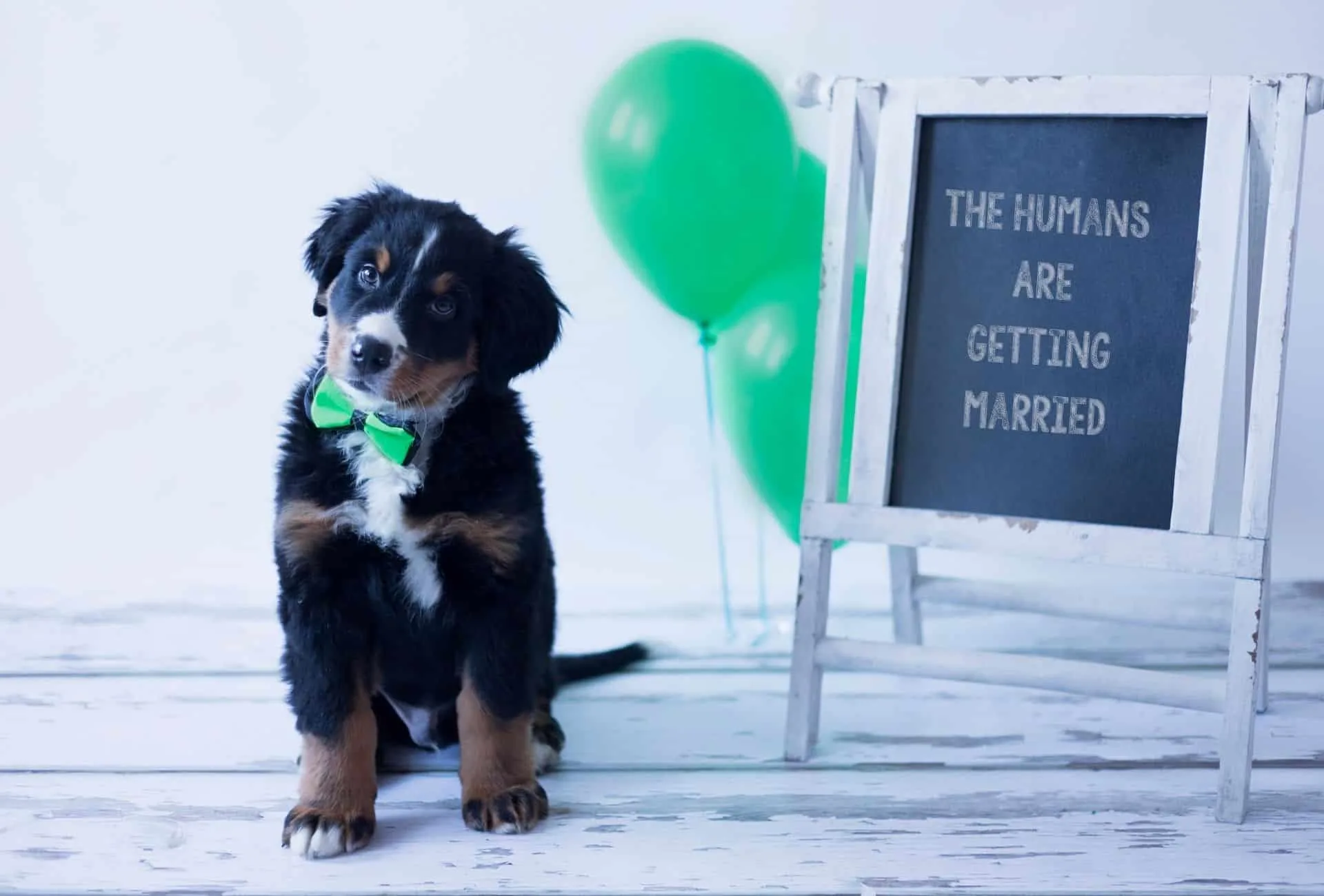
However, this large dog can weigh north of 100 pounds (45kg+) and can be quite strong and goofy when playing. Always supervise your dog playing with the child.
Due to their size, these dogs might be a bit more intimating to kids, but they look super sweet and kids love their medium-length coats.
9. Newfoundland
Often labeled as a gentle giant, Newfoundlands are known to be calm family dogs and are well-suited for therapy work with shy or timid children.
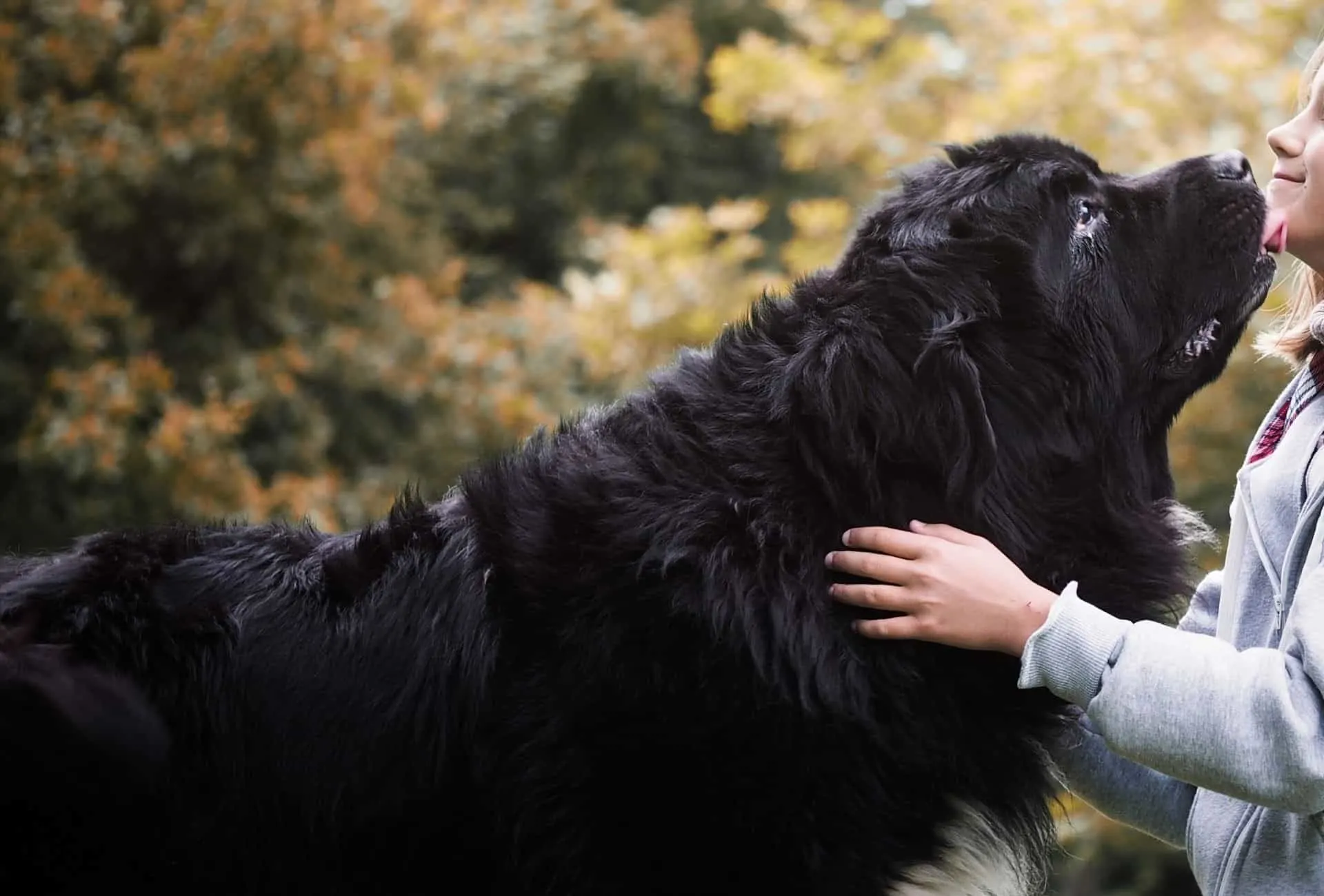
However, they’re big boys and can look intimidating especially when they come in black.
If you’re into large breeds, this teddy bear is not only a super fluffy breed but also balanced.
On another note; big boys come with more slobber, shedding, etc. so take that into account.
10. Great Dane
Great Danes are known for being the largest dog breed in the world.
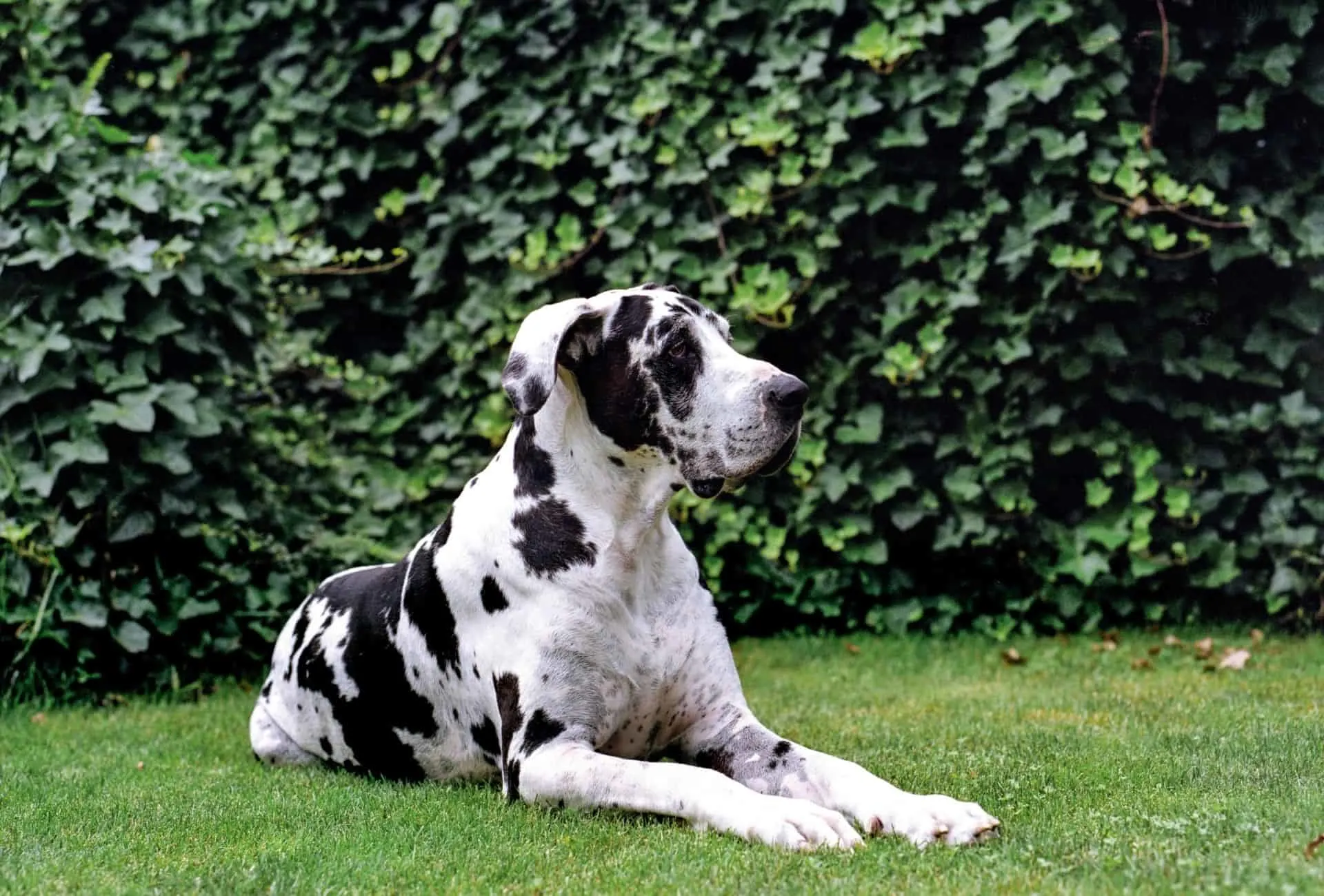
While some Great Danes can be humungous, others are on the “smaller” side. But make no mistake, all Great Danes are big dogs and need space, more food, and appropriate exercise that doesn’t hurt the joints.
11. Cane Corso (not for beginners)
The Cane Corso has risen in popularity in the U.S. in the last couple of years.
Unfortunately, with popularity, there’s an influx of irresponsible breeders seeking to make a quick buck.
Many people are looking into this breed because they heard of their guarding instinct.
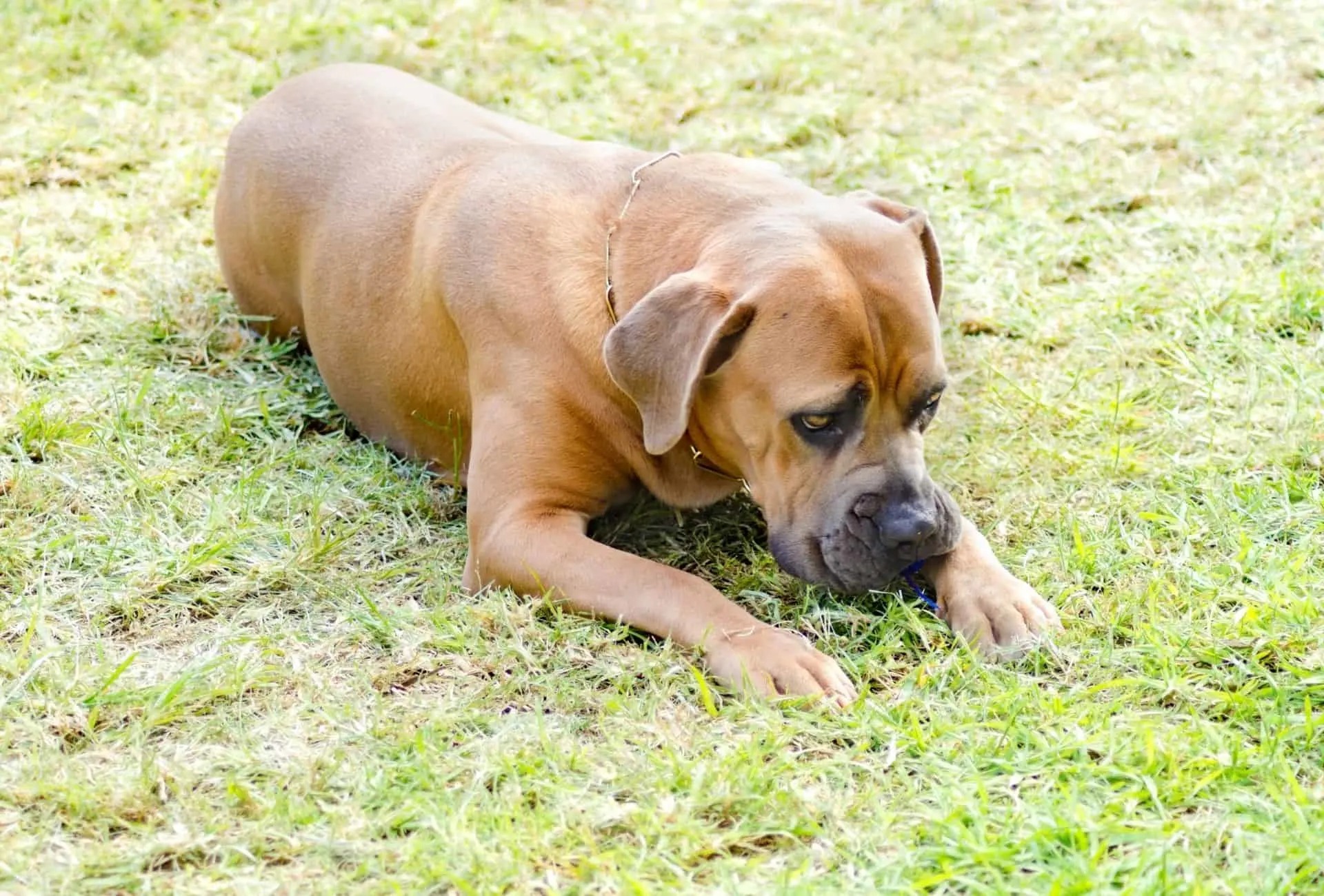
Make no mistake, the Cane Corso is an excellent guard dog and protector for your child but they can be incredibly gentle within the family.
However, they’re often not very fond of strangers and require strict socialization as well as clear and fair leadership.
12. Rottweiler (not for beginners)
I own a 100-pound Rottie girl and she’s absolutely adorable with kids and other animals.
While the Rottweiler is neither a breed to take advantage of for other dogs nor a breed that tolerates unfair treatment, they can be incredibly sweet if the handler has the right knowledge and invests time into training them.
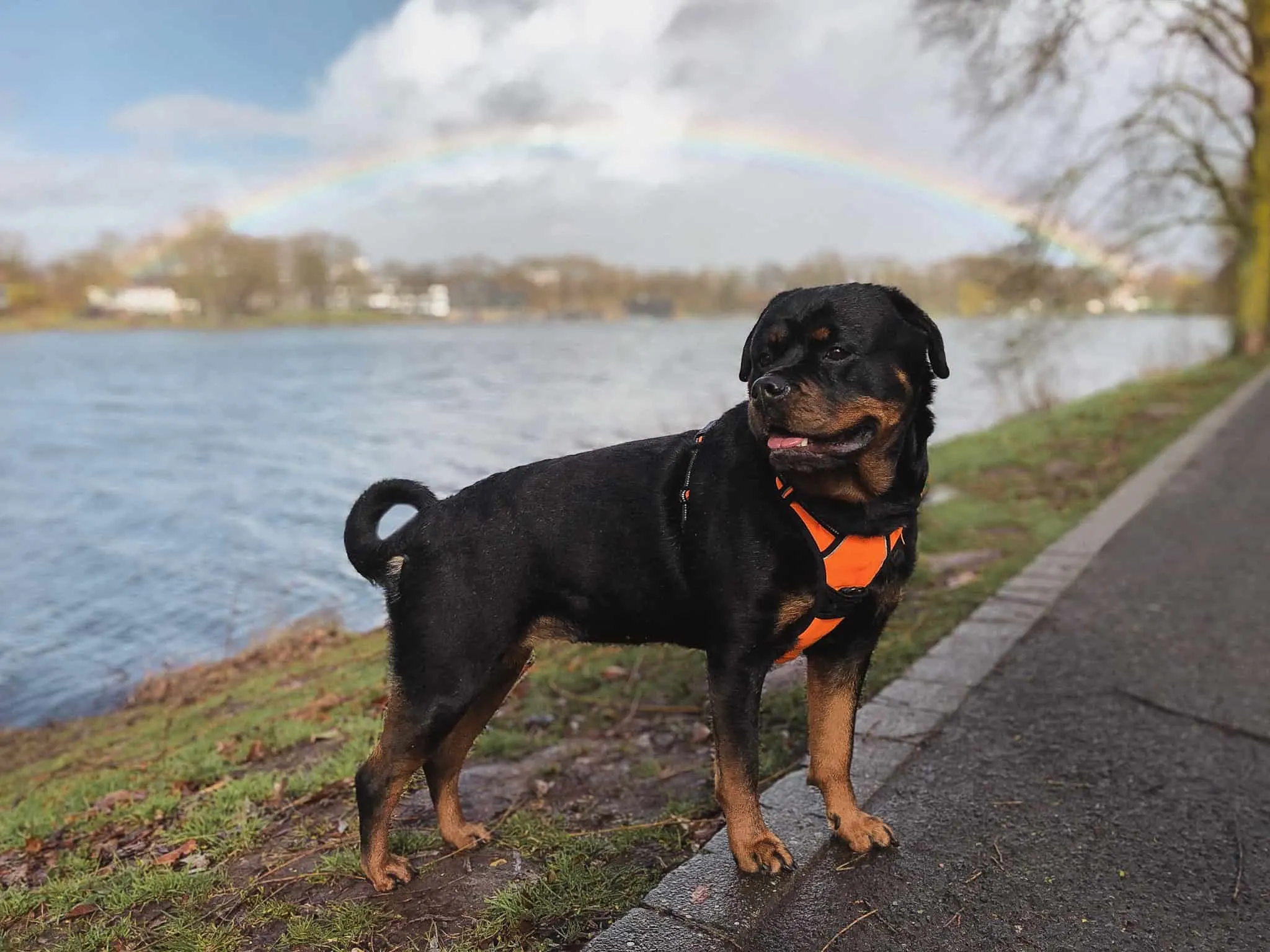
While you can get this dog as a beginner, I wouldn’t recommend it if you’re already struggling big-time with a child that is scared of dogs and you can’t invest too much time into making the relationship work.
Don’t be fooled by the puppy eyes.
While the Rottweiler is one of the best puppies your toddler can grow up with, Rottie pups grow quickly.
The Calmest Dog Won’t Solve a Child’s Problem
Even if you get a child-friendly and very calm dog, you’ll still need to address the underlying problem of your child’s anxiety.
No matter if it’s past traumatic experiences, your own fear, or just a lack of contact – there are two things that will help.
Gradual desensitization and counter-conditioning.
Sounds like dog training? Well, it kinda is.
Make sure to take it slow and start by introducing a dog you know will react calmly and then gradually work your way up.
Don’t Rely On The Dog’s Breed
Every dog breed can be great with kids.
And every individual dog can be bad with kids.
Just because you get a Golden Retriever doesn’t mean they’ll automatically be best friends with your kid. Some have had traumatic experiences themselves, especially with small children.
The biggest, most intimidating-looking canine can actually be a gentle pooch.
Genetics, temperament, and socialization decide what it’ll be.
Breeds just have tendencies and we’re aiming to lean into these tendencies.
If a dog doesn’t like kids, it can be due to the kids invading the dog’s space, being very hectic/loud, ignoring warning signals, jumping on him, pulling the tail, or being disrespectful in general.
The dog should be a family member and some dogs just don’t like having their space invaded. If your kid does that and the dog isn’t taking it, it might have nothing to do with children in particular but how they behave.
Very anxious dogs might get easily startled and nearly every dog has some threshold of what they’re taking in terms of ear or tail-pulling.
Teach your child how to behave around the dog and desensitize as well as counter-condition your pooch.
Let me know in the comments what your experiences are with kids who are anxious around dogs and how you were able to (hopefully) solve it!
References
- National Library of Medicine, 2022: Can dogs reduce stress levels in school children? ↩︎
- National Library of Medicine, 2017: Effect of Pet Dogs on Children’s Perceived Stress and Cortisol Stress Response ↩︎
- National Library of Medicine, 2018: Companion animals and human health: benefits, challenges, and the road ahead for human-animal interaction ↩︎

Darlene Morton
Tuesday 21st of December 2021
So disappointing to see your list does not include Cavalier King Charles Spaniels. I have 3 & live next to a public school & all of my dogs love getting little hands through the school fence petting them. Tails wag furiously wagging their entire hind end. Occasionally I have a litter of puppies from one of my little girls & many have gone as therapy dogs as they are so soothing to stroke & sit on laps of nervous, abused people with anxiety problems & autistic & ADHD children. They seem unable to bite & are very friendly to all strangers.